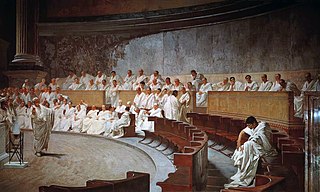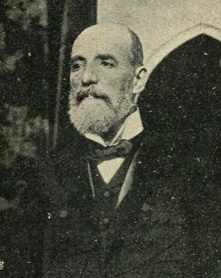
Marcus Tullius Cicero was a Roman statesman, lawyer, scholar, philosopher and Academic Skeptic, who tried to uphold optimate principles during the political crises that led to the establishment of the Roman Empire. His extensive writings include treatises on rhetoric, philosophy and politics, and he is considered one of Rome's greatest orators and prose stylists. He came from a wealthy municipal family of the Roman equestrian order, and served as consul in 63 BC.

Lucius Sergius Catilina, known in English as Catiline, was a Roman patrician, soldier and senator of the 1st century BC best known for the second Catilinarian conspiracy, an attempt to overthrow the Roman Republic and, in particular, the power of the aristocratic Senate. He is also known for several acquittals in court, including one for the charge of adultery with a Vestal Virgin.

The Catiline or Catilinarian Orations are a set of speeches to the Roman Senate given in 63 BC by Marcus Tullius Cicero, one of the year's consuls, accusing a senator, Lucius Sergius Catilina (Catiline), of leading a plot to overthrow the Roman Senate. Most accounts of the events come from Cicero himself. Some modern historians, and ancient sources such as Sallust, suggest that Catiline was a more complex character than Cicero's writings declare, and that Cicero was heavily influenced by a desire to establish a lasting reputation as a great Roman patriot and statesman. This is one of the best-documented events surviving from the ancient world, and has set the stage for classic political struggles pitting state security against civil liberties.
Publius Cornelius Lentulus Sura was one of the chief figures in the Catilinarian conspiracy. He was also the step-father of the future triumvir Mark Antony.
Gaius Antonius Hybrida was a politician of the Roman Republic. He was the second son of Marcus Antonius and brother of Marcus Antonius Creticus; his mother is unknown. He was also the uncle of the famed triumvir Mark Antony. He had two children, Antonia Hybrida Major and Antonia Hybrida Minor.

Senatus consultum ultimum, is the modern term given to a decree of the Roman Senate during the late Roman Republic that was passed in times of emergency. It expressed the opinion that to preserve the republic, an urgent threat needed countering. Although an SCU could grant rhetorical or argumentative support to the use of state power, it did not change a magistrate's legal powers or deprive a Roman citizen of his right to a trial. In effect, it served as a declaration of a state of emergency or martial law.
Publius Cornelius Sulla was a politician of the late Roman Republic and the nephew of Lucius Cornelius Sulla. He was also a brother-in-law of Pompey, having married his sister Pompeia.
Publius Autronius Paetus was a politician of the late Roman Republic who was involved in the conspiracy of Catiline.
Decimus Junius Silanus was a consul of the Roman Republic. He may have been the son of Marcus Junius Silanus, consul in 109 BC. He was the stepfather of Marcus Junius Brutus, having married Brutus' mother, Servilia.

The Philippics are a series of 14 speeches composed by Cicero in 44 and 43 BC, condemning Mark Antony. Cicero likened these speeches to those of Demosthenes against Philip II of Macedon; both Demosthenes’s and Cicero's speeches became known as Philippics. Cicero's Second Philippic is styled after Demosthenes' De Corona.

The political career of Marcus Tullius Cicero began in 76 BC with his election to the office of quaestor, and ended in 43 BC, when he was assassinated upon the orders of Mark Antony. Cicero, a Roman statesman, lawyer, political theorist, philosopher, and Roman constitutionalist, reached the height of Roman power, the Consulship, and played a critical role in the transformation of the Roman Republic into the Roman Empire. A contemporary of Julius Caesar, Cicero is widely considered one of Rome's greatest orators and prose stylists.

Cesare Maccari was an Italian painter and sculptor, most famous for his 1888 painting Cicerone denuncia Catilina.
Catiline or Catilina (Latin) may refer to:

The gens Sergia was a patrician family at ancient Rome, which held the highest offices of the Roman state from the first century of the Republic until imperial times. The first of the Sergii to obtain the consulship was Lucius Sergius Fidenas in 437 BC. Despite long and distinguished service, toward the end of the Republic the reputation of this gens suffered as a result of the conspiracy of Catiline.
In the history of the Roman Republic, the first Catilinarian conspiracy was a plot to murder the consuls of 65 BC, Lucius Manlius Torquatus and Lucius Aurelius Cotta. Supposedly, Catiline intended to seize power following an electoral dispute, in which the original set of candidates elected to the office were deemed ineligible. Historians consider it unlikely that Catiline would have been involved in the first Catilinarian conspiracy or, indeed, that the conspiracy existed at all. Two years later, Catiline would lead the Second Catilinarian conspiracy, better known as the Catiline Conspiracy, to overthrow Cicero and his co-consul Gaius Antonius Hybrida.
The second Catilinarian conspiracy, also known simply as the Catiline conspiracy, was a plot, devised by the Roman senator Lucius Sergius Catilina, with the help of a group of fellow aristocrats and disaffected veterans of Lucius Cornelius Sulla, to overthrow the consulship of Marcus Tullius Cicero and Gaius Antonius Hybrida. Late in the year of 63 BC, Cicero exposed the conspiracy and forced Catiline to flee from Rome. The conspiracy was chronicled by Sallust in his work The Conspiracy of Catiline, and this work remains an authority on the matter.
In Toga Candida is a speech given by Cicero during his election campaign in 64 BC for the consulship of 63 BC. The speech was directed at his competitors, Catilina and Antonius, who were also running for consulship for the same year. The speech no longer survives, though a commentary on it written by Asconius does survive.
The gens Mallia was a plebeian family at ancient Rome. Due to its relative obscurity, the nomen Mallius is frequently, but erroneously amended to the more common Manlius. The only member of this gens to obtain any of the higher curule magistracies under the Republic was Gnaeus Mallius Maximus, consul in 105 BC.
In Roman rhetoric, a clausula was a rhythmic figure used to add finesse and finality to the end of a sentence or phrase. There was a large range of popular clausulae. Most well known is the classically Ciceronian esse videātur type.
Gaius Cornelius Cethegus was a Roman senator and politician.








